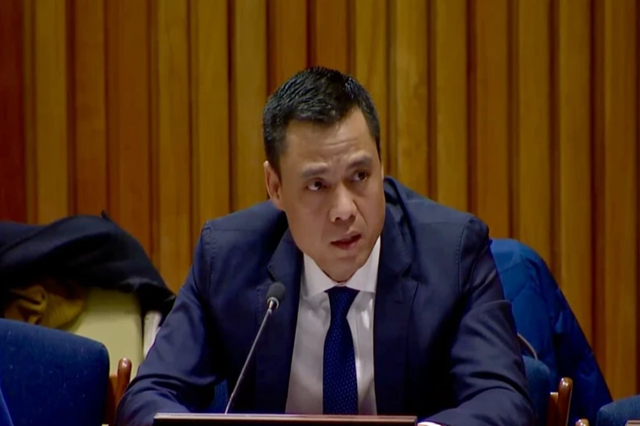
Ambassador Dang Hoang Giang, Head of the Permanent Mission of Vietnam to the United Nations. (Photo: Thanh Tuan/VNA)
|
On April 18, within the framework of the “Sustainable Development Week,” the United Nations General Assembly held a High-level Discussion on Promoting Sustainable Development through Infrastructure Connectivity.
Attending the Discussion were President of the United Nations General Assembly Dennis Francis, President of Poland Andrzej Duda, and representatives from member countries of the United Nations.
New York-based reporter cited President of the United Nations General Assembly Dennis Francis highlighting the importance of the infrastructure development strategy in achieving all sustainable development goals, while emphasizing the requirement for increased financial support and investment in quality, reliable, and sustainable infrastructure.
Participating countries at the Discussion also shared their experiences, best practices and challenges with a view to narrowing the gap in infrastructure development and connectivity, as well as promoting partnership, solidarity, and innovation to develop sustainable infrastructure.
Speaking at the discussion, Ambassador and Head of the Permanent Mission of Vietnam to the United Nations Dang Hoang Giang affirmed that promoting connectivity between and within countries is needed for economic development, job creation, ensuring the effectiveness of supply chains, and enhancing sustainability.
To promote infrastructure connectivity, Ambassador Dang Hoang Giang proposed enhancing international cooperation and solidarity by providing financial and technical support to narrow the gap in infrastructure development, especially with developing countries.
Countries need to improve the resilience of the infrastructure system by investing in renewable energy, green transportation technology, and digital infrastructure with institutional and financial contributions from both the public and private sectors.
At the same time, global efforts on infrastructure connectivity need to be combined with initiatives at the regional and national levels, exemplified by the Master Plan on ASEAN Connectivity 2025 which aims to enhance regional connectivity and support infrastructure projects’ life cycle in the region.
|
Vietnam is one of the Asian countries with the most advanced infrastructure investment, allocating 5.7% of GDP for projects in this field. |
Ambassador Dang Hoang Giang emphasized that building a modern and synchronous infrastructure system is one of three strategic breakthroughs for sustainable development of the Vietnamese government.
Vietnam is one of the Asian countries with the most advanced infrastructure investment, allocating 5.7% of gross domestic product (GDP) to projects in this area.
So far, Vietnam has put 1,729 km of expressway into operation and is working towards reaching 3,000 km by 2025. Furthermore, Vietnam continues to develop infrastructure links with neighboring countries, including Laos, to promote regional and interregional connectivity.
The Vietnamese government continues to give priority to developing sustainable infrastructure through investments in renewable energy, green transportation systems, as well as encouraging the manufacturing and using of electric public transport vehicles.
Ambassador Dang Hoang Giang also expressed his gratitude for official development assistance (ODA) partners who have timely and effectively supported Vietnam’s infrastructure development projects.
This year’s “Sustainable Development Week,” which took place from April 15-19, was an initiative of the President of the seventy-eighth session of the UN General Assembly to host a series of High-level Meetings of the UN General Assembly to discuss topics related to sustainable development with a view to attracting participation from top leaders of countries, thereby contributing to mobilizing political will, facilitating the implementation of the 2030 Agenda for Sustainable Development./.
Thanh Tuan













